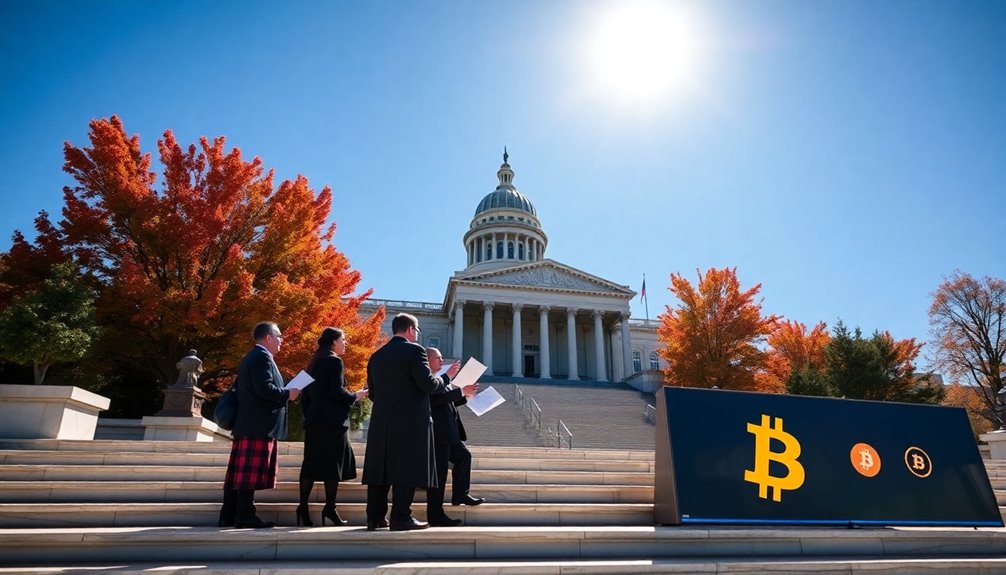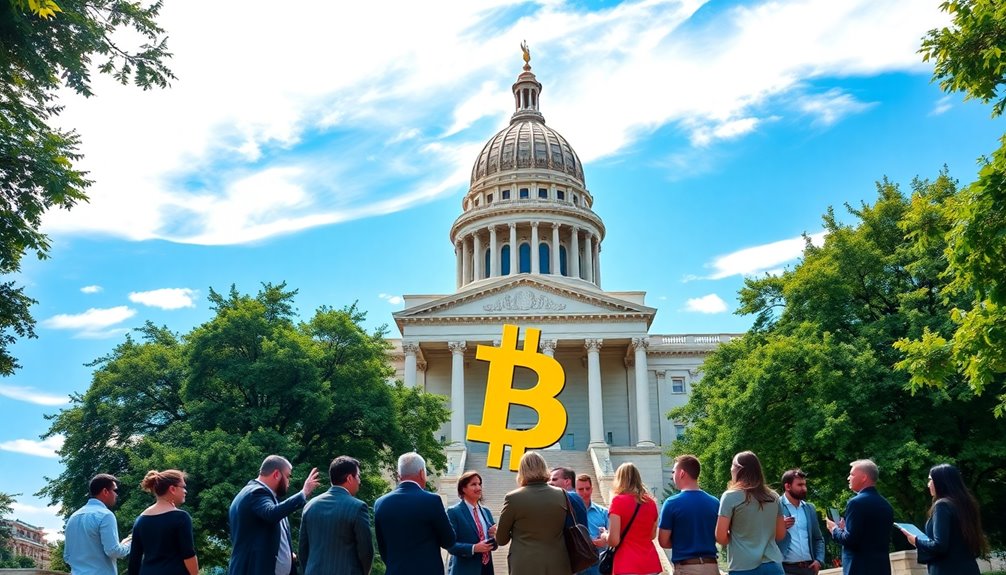Oklahoma's proposed Bitcoin Reserve Act aims to boost the state economy by allowing it to hold Bitcoin as a reserve asset. Introduced by Rep. Cody Maynard, this act could diversify financial portfolios and attract tech companies. It permits state pension funds to invest up to 10% in digital assets, potentially enhancing financial stability and creating jobs in the digital finance sector. By embracing Bitcoin, Oklahoma positions itself as a leader in innovation while safeguarding residents' financial interests. If you're curious about the specifics and potential implications, there's much more to uncover.
Key Takeaways
- The Bitcoin Reserve Act allows Oklahoma to hold Bitcoin as a reserve asset, diversifying the state's financial portfolio.
- By investing state funds in Bitcoin, the Act aims to enhance financial stability and reduce reliance on traditional assets.
- The finite supply of Bitcoin serves as a hedge against inflation, protecting citizens' money from government manipulation.
- Embracing digital assets could attract tech companies, foster job creation, and stimulate growth in the digital finance sector.
- The Act positions Oklahoma as a leader in cryptocurrency innovation, potentially influencing other states to adopt similar measures.
Overview of House Bill 1203

House Bill 1203, introduced by Rep. Cody Maynard on January 15, 2025, aims to position Oklahoma as a leader in sound money principles and innovative fiscal policy.
It aligns with President Trump's vision for digital assets and financial stability. The key objective is to protect and grow the state's financial future by allowing investments from state savings accounts and pension funds in digital assets like Bitcoin. In line with this initiative, eight US states are also pursuing Bitcoin Strategic Reserve initiatives, reflecting a growing trend in state financial management.
If passed, the bill would take effect on November 1, 2025. It permits investments up to 10% of total fund values in digital assets with market caps over $500 billion.
Additionally, it sets custody requirements to ensure secure storage and management of these investments, enhancing Oklahoma's financial landscape.
Investment Strategies in Digital Assets

As the world of finance evolves, exploring investment strategies in digital assets like Bitcoin can open up exciting opportunities for growth and diversification.
One effective approach is staking, where you lock up your assets to validate a blockchain and earn rewards. It offers predictable returns but comes with risks like asset illiquidity. Active investment strategies can enhance returns while maintaining exposure to market growth. Additionally, some platforms, like Ethereum's transition to proof-of-stake, are enhancing scalability and rewards for stakers.
Lending is another strategy, allowing you to supply liquidity to borrowers while retaining custody of your assets, which can yield higher returns.
Alternatively, you can use options strategies, generating yield while accumulating assets, though market volatility poses a risk.
Lastly, consider yield-generating derivatives for predictable returns and portfolio diversification, but be mindful of the complexities involved.
Each method has its tools and considerations, so choose wisely.
Economic Rationale for the Act

Investing in digital assets like Bitcoin not only presents opportunities for growth but also serves as a strategic move for economic stability. With its finite supply of 21 million coins, Bitcoin offers a hedge against inflation that traditional currencies can't match. Its decentralized nature protects citizens' hard-earned money from government manipulation, ensuring autonomy in financial decisions. By diversifying state pension funds and savings accounts, Oklahoma aims to enhance financial stability and reliability for its residents. This act embodies fiscal responsibility and progressive governance, positioning the state as a leader in Bitcoin reserve policies. Ultimately, embracing Bitcoin could foster long-term growth and safeguard the financial interests of Oklahoma's citizens for generations to come.
Impact on State Economy

While many states grapple with economic uncertainty, Oklahoma's Bitcoin Reserve Act promises to bolster the state's economy through innovative financial strategies.
By investing in Bitcoin, you can hedge against inflation and safeguard purchasing power. Diversifying investments reduces reliance on traditional assets, enhancing financial stability. With investments capped at 10% of fund values, prudent management is ensured. The act aligns with Oklahoma's strategic vision to prepare for a future dominated by digital assets.
This act opens up investment opportunities for state retirement funds, promoting job creation and attracting cryptocurrency businesses to Oklahoma. Increased liquidity in financial markets can spur economic activity, giving the state a competitive edge.
Emphasizing transparency and accountability, the act prepares Oklahoma for a future where digital assets play a vital role in the economy, positioning it for long-term growth.
Legislative Timeline and Process

To understand how the Oklahoma Bitcoin Reserve Act progresses through the legislative process, it's essential to follow the established timeline.
Lawmakers submit bill requests by early December, and by mid-January, they must introduce bills with substantive language. The 60th Oklahoma Legislature convenes on February 3.
By late February, the bill must pass a standing committee in its chamber of origin. It must then advance to the full chamber by mid-March.
After that, it heads to the opposite chamber, where it must pass another committee by mid-April and the full chamber by late April.
Finally, eligible bills reach the Governor's desk for signature by May, as the Legislature adjourns sine die by the last Friday of May. The process is crucial for ensuring that the legislative changes reflect the will of the voters every two years.
National and Global Trends

As the Oklahoma Bitcoin Reserve Act moves through the legislative process, it reflects a broader trend in national and global financial systems.
More nation-states are adopting Bitcoin as a strategic reserve asset to combat inflation and stabilize their economies. Countries like El Salvador and Argentina are already setting up national Bitcoin reserves, while the U.S. reassesses its stance on this digital asset. This movement is gaining momentum, with states like Oklahoma proposing legislation to diversify financial portfolios. Emerging markets, particularly in Latin America, are leveraging Bitcoin for economic resilience against high inflation. Notably, the Bitcoin Act of 2024 proposed by U.S. Senator Cynthia Lummis seeks to establish a national strategic BTC reserve, highlighting the increasing interest in Bitcoin reserves among nations. Crypto whales often play a significant role in market dynamics, influencing the price and adoption of Bitcoin globally.
As these trends unfold, Bitcoin's decentralized framework offers a safeguard against economic uncertainty, making it increasingly attractive for long-term financial planning.
Future of Digital Assets in Oklahoma

Oklahoma is positioning itself at the forefront of digital asset innovation, driven by a proactive legislative approach.
With proposed laws like HB3594, you'll see increased clarity and protection for your rights to digital assets, ensuring that local governments can't hinder their use.
The Bitcoin Freedom Act (SB325) empowers you to choose Bitcoin for payments, enhancing your financial flexibility. This flexibility allows individuals to adapt to Bitcoin volatility and make informed financial decisions.
As Oklahoma explores the Strategic Bitcoin Reserve Act, state funds could diversify through Bitcoin investments, safeguarding against inflation. This legislation aims to protect citizens' purchasing power against inflation risks.
By embracing digital assets, Oklahoma aims to solidify its leadership role nationally and adapt to the evolving financial landscape.
This forward-thinking approach could open up more opportunities for you and your community in the digital economy.
Frequently Asked Questions
How Will Bitcoin Investments Be Regulated in Oklahoma?
In Oklahoma, Bitcoin investments will be regulated through a legislative framework that focuses on prudent management and risk mitigation.
You'll see state savings accounts and pension funds allowed to invest in Bitcoin, with fund managers deciding the allocation percentages.
Transparency and regular audits will ensure accountability, while a potential regulatory body may oversee these investments.
This approach aims to diversify financial portfolios and protect purchasing power against inflation, aligning with broader trends in cryptocurrency adoption.
What Risks Are Associated With Investing in Bitcoin?
Investing in Bitcoin can feel like navigating a stormy sea; the waves of risk can be daunting.
You face transaction irreversibility, meaning mistakes can cost you dearly. The technical complexity of managing wallets and private keys might leave you feeling adrift.
Security risks loom from hacks, while regulatory uncertainty can shake your confidence.
Lastly, be wary of counterparty risks, where deceptive practices can lead to significant losses.
Stay vigilant and informed!
Can Residents Directly Invest in State-Funded Bitcoin Accounts?
You can't directly invest in state-funded Bitcoin accounts.
The legislation allows state fund managers to buy Bitcoin, but it doesn't provide residents with the option to invest in these accounts.
Decisions about investments are strictly controlled by state officials, so individual participation isn't an option.
If you're interested in Bitcoin, you'll need to explore personal investment avenues outside of state-managed funds.
Will This Act Affect Local Businesses Accepting Bitcoin?
Yes, this act could significantly affect local businesses accepting Bitcoin.
You might see increased demand as more customers seek to use cryptocurrency. With clearer regulations, adopting Bitcoin could become easier, giving you a competitive edge.
Additionally, you may tap into new revenue streams and attract tech-savvy customers.
However, be prepared for challenges like transaction volatility and security risks, which you'll need to address to ensure successful integration into your business model.
How Will the Public Be Informed About the Act's Progress?
Public participation plays a pivotal role in progress.
You'll find updates on the act's status through press releases and legislative reports, ensuring you're in the know. Engage in public forums and town hall meetings to voice your views, while online polls help gauge collective sentiment.
Follow social media channels for real-time reactions and news coverage. By staying connected, you can actively participate in shaping the conversation surrounding this significant legislation.
Conclusion
As Oklahoma moves forward with House Bill 1203, you can see the potential for a digital asset revolution. By embracing cryptocurrency, the state isn't just diversifying its investments; it's positioning itself as a pioneer in the digital economy. Could this bold step lead to a more resilient financial future? Only time will tell, but if other states follow suit, you might find Oklahoma at the forefront of a transformative trend in economic strategy.









